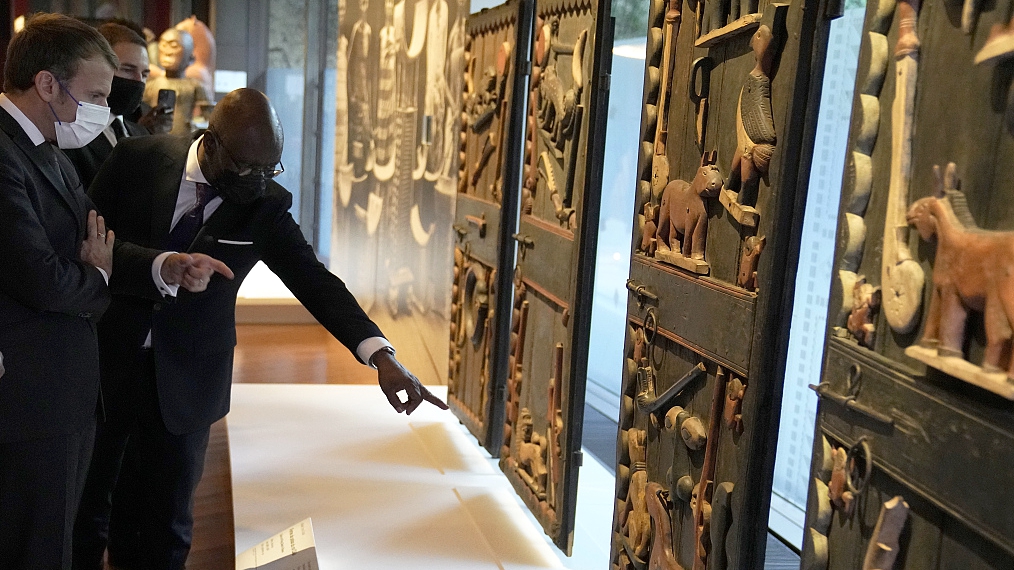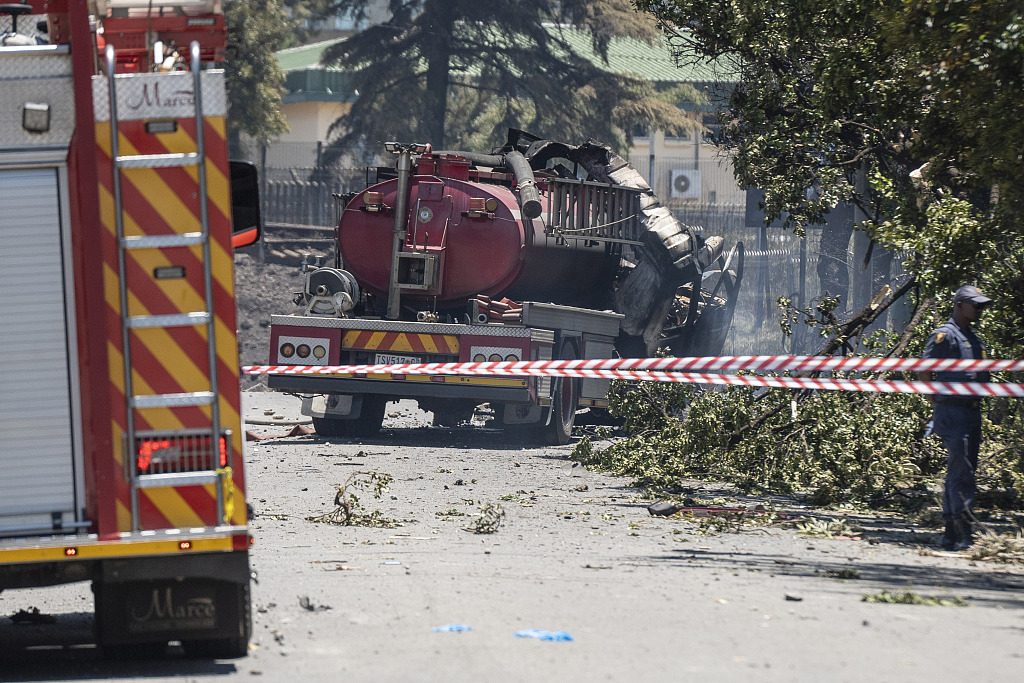
French President Emmanuel Macron (L) looks at the doors of King Glele's palace from Benin 19th century, at the Quai Branly museum, Paris, France, October 27, 2021. /CFP
French President Emmanuel Macron (L) looks at the doors of King Glele's palace from Benin 19th century, at the Quai Branly museum, Paris, France, October 27, 2021. /CFP
Editor's note: Ma Hanzhi is an assistant research fellow from Department for Developing Countries Studies, China Institute of International Studies (CIIS). The article reflects the author's opinions and not necessarily those of CGTN.
In recent years, anti-French sentiments of the former French colonial countries in Africa have risen, while more anti-French demonstrations have broken out in Mali, Niger, Chad, Burkina Faso and other countries. Last January, Mali's transitional government expelled the French ambassador under a 72-hour deadline.
Many Africans feel disappointed about the French army's anti-terrorism efforts in the continent, especially in the Sahel region as France's anti-terrorism efforts have not achieved the expected results of eliminating extremist forces and protecting regional security. African countries feel very dissatisfied with the major powers interfering in their internal affairs, considering the disasters that France had inflicted on Africa during the colonial period.
The French government is also aware and trying to resolve them. French President Emmanuel Macron has taken revolutionary measures to place French-African relations on the right track. The Macron government has set up The African Affairs Committee, which selects young and middle-aged Africans from civil society as members (more than half of whom are French Africans), to formulate France's policy on Africa.
France stands devoted to diluting the colonial color in Franco-African relations. Macron promotes monetary reform of the Economic Community of West African States (ECOWAS), boosting issuance of the single currency "Eco," while withdrawing French representatives from some financial institutions in the continent. Meanwhile, Macron endorses the return of cultural relics looted from Africa during the colonial period and recognizes that France should be held responsible for the historical genocide in Rwanda.
Macron has enhanced Africa's strategic position in diplomacy. After getting re-elected, he visited Africa as his first destination outside Europe, saying, "France cannot lose its historical influence in Africa" and Africa is the "priority" of French diplomacy.

A destroyed truck after a fuel tanker explosion in the Boksburg region, Johannesburg, South Africa, December 24, 2022. /CFP
A destroyed truck after a fuel tanker explosion in the Boksburg region, Johannesburg, South Africa, December 24, 2022. /CFP
Macron is recovering France's diminished influence in Africa. Nonetheless, his policy adjustments to Africa are utilitarian and not reversing the deteriorating France-Africa relations.
France's failure in Africa has brought enlightenment to the international community. Therefore, it's urgent for the two sides to build a new type of international relations featuring mutual respect, fairness, justice and win-win cooperation. For a long time, France has controlled the economic lifeline of Africa, especially the French-speaking African countries, via neo-colonialism, and has exerted its influence over Africa through informal channels. Only by promoting the construction of a new type of international relations with mutual respect, fairness and justice, and win-win cooperation as its core can France enhance its relations with the region and head toward a new direction.
The security situation in Africa is not optimistic, while terrorism continues to spread. Accordingly, the international community should support related parties to give full play to their autonomy under the principle of non-interference in internal affairs, improving their own capabilities to deal with the forces of violence and terrorism.
Overstepping others, relying solely on military forces and believing in absolute power only aggravate the conflicts. That many international and regional hot spots have fallen into a dead end is inseparable from the brutal interference of major powers. The impulse of big powers to intervene is expanding their influence, but they will either withdraw in confusion or lose more than they deserve.
It's time for involved countries to adhere to the vision of common, comprehensive, cooperative and sustainable security, as introduced by China. In recent years, the runaway security situation in Africa is connected to the brutal interference of the United States and West, along with the complexity of solving security problems in Africa, which requires comprehensive measures. China's vision can play a crucial role. The sustainability of Africa's security can be guaranteed only by resolving conflicts and promoting development with solidarity.
(If you want to contribute and have specific expertise, please contact us at opinions@cgtn.com. Follow @thouse_opinions on Twitter to discover the latest commentaries in the CGTN Opinion Section.)